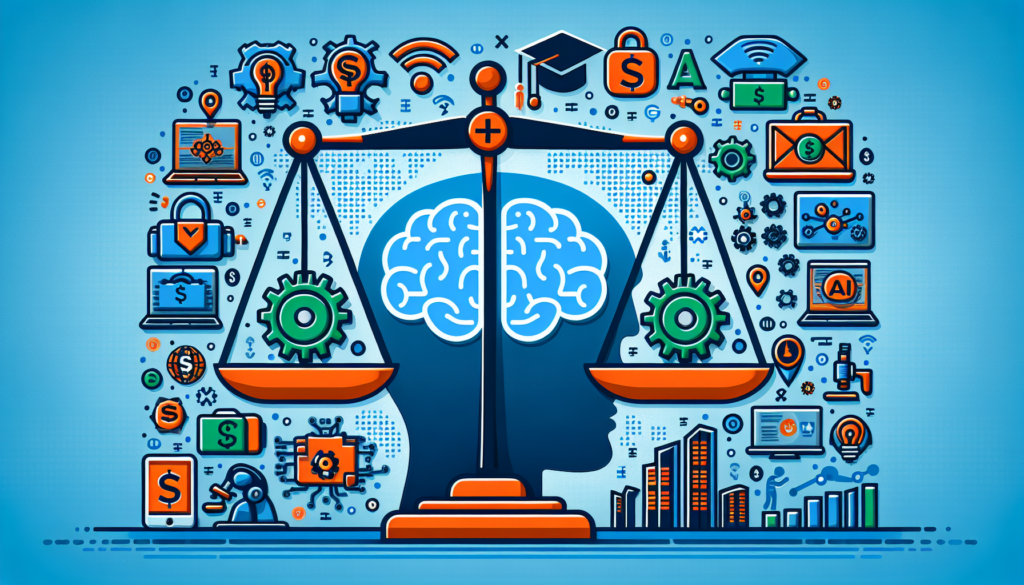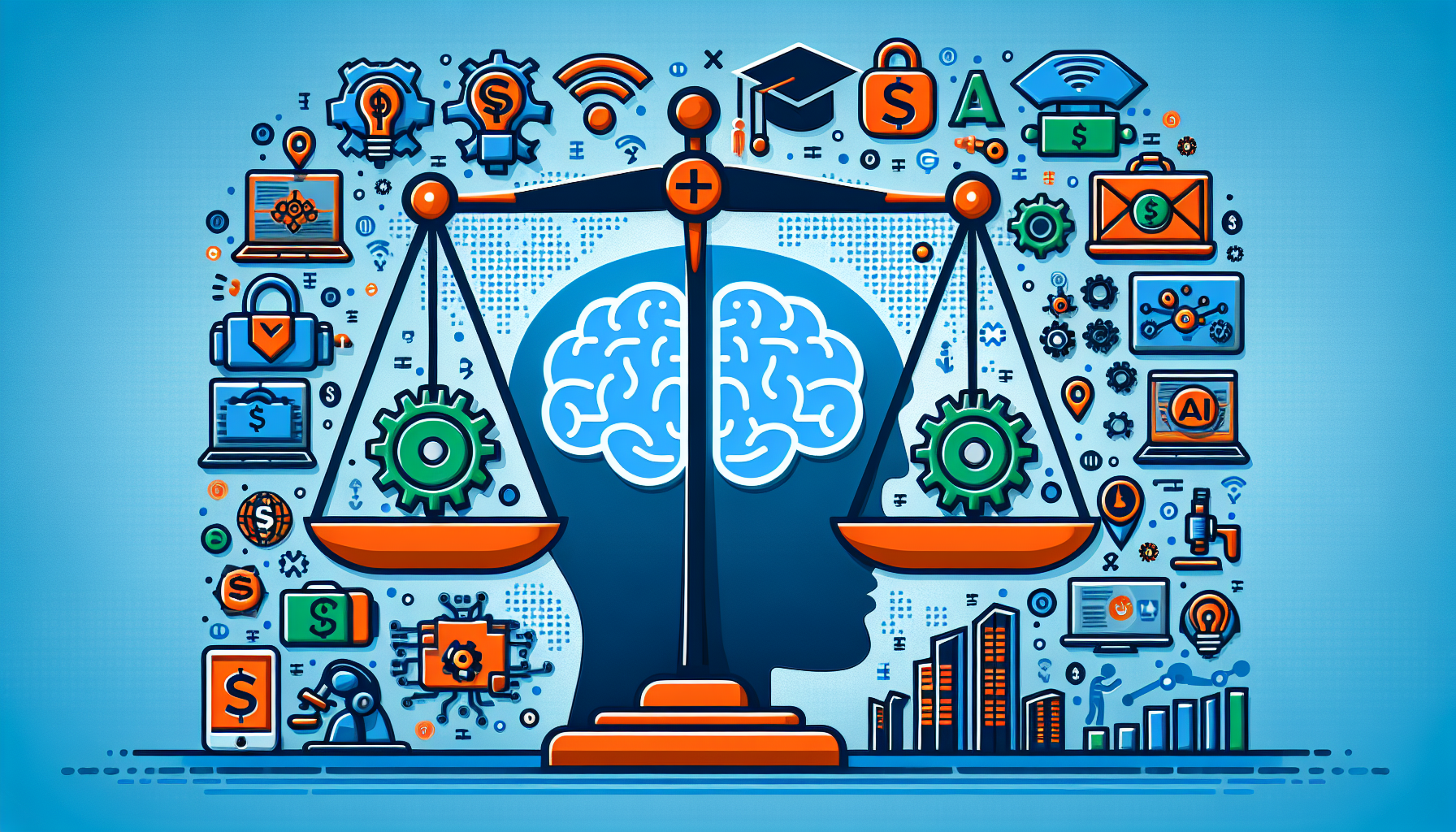Are you considering a career in AI and ML? Perhaps you’ve heard the hype surrounding these cutting-edge technologies, but you’re unsure if they would make a good career path for you. Well, look no further. In this article, we’ll explore the opportunities, challenges, and potential rewards of embarking on a journey in the field of Artificial Intelligence and Machine Learning. So, whether you’re a tech enthusiast or simply curious about the future of work, let’s uncover the truth behind the allure of AI and ML as a career choice.

What is AI and ML?
Definition of AI
AI, or Artificial Intelligence, is a branch of computer science that focuses on creating intelligent machines capable of performing tasks that would typically require human intelligence. These machines are designed to replicate human cognitive abilities, such as learning, problem-solving, and decision-making. AI encompasses various technologies, including machine learning, natural language processing, computer vision, and robotics.
Definition of ML
ML, or Machine Learning, is a subset of AI that focuses on using algorithms and statistical models to enable computer systems to learn and make predictions or decisions without being explicitly programmed. ML algorithms analyze large amounts of data, identify patterns, and learn from experience to improve their performance over time. This technology plays a crucial role in many AI applications and enables machines to improve their accuracy and performance through continuous learning.
Difference between AI and ML
While AI and ML are closely related, they differ in their scope and approach. AI is a broader concept that encompasses the development of intelligent machines, whereas ML is a specific technique employed within AI to enable machines to learn from data. ML is a subfield of AI that relies heavily on statistical models and algorithms to improve performance based on patterns and examples. In other words, ML is a tool used to achieve AI.
Industry Growth and Demand
Rapid growth of AI and ML
The field of AI and ML has experienced significant growth in recent years. Advancements in technology, increased computing power, and the explosion of data have contributed to the rapid development of AI applications. Organizations across various industries are increasingly adopting AI and ML solutions to boost efficiency, accuracy, and decision-making capabilities. This exponential growth trend is expected to continue, making AI and ML one of the most sought-after fields in the technology sector.
Increased demand for AI and ML professionals
As the use of AI and ML continues to expand, the demand for professionals with the skills and knowledge in these areas has skyrocketed. Companies are racing to hire individuals who can develop, implement, and maintain AI and ML systems to gain a competitive edge. From startups to large enterprises, organizations are seeking AI and ML talent across industries such as healthcare, finance, e-commerce, and technology. This surge in demand presents exciting career opportunities for individuals looking to enter the field.
Job opportunities in AI and ML
The rise of AI and ML has resulted in a wide range of job opportunities in the field. Some of the popular career paths include Machine Learning Engineer, Data Scientist, AI Research Scientist, AI Ethics Consultant, AI Product Manager, and Robotics Engineer. These roles require a combination of technical skills, domain knowledge, and problem-solving abilities. With the ever-increasing demand for AI and ML professionals, individuals can expect to find diverse and fulfilling job prospects in this field.
Benefits of AI and ML Career
High salary potential
One of the major attractions of pursuing a career in AI and ML is the high salary potential. With the demand for AI and ML professionals exceeding the supply, companies are willing to offer competitive salaries to attract and retain top talent. The average salaries for AI and ML roles such as Data Scientists and Machine Learning Engineers are significantly higher than the average salaries in many other fields. This provides a strong financial incentive for individuals considering a career in AI and ML.
Continuous learning and growth
AI and ML are dynamic fields that constantly evolve with new technologies, algorithms, and techniques. This presents professionals with the opportunity for continuous learning and growth. As the field advances, individuals have access to a wealth of resources, research papers, and online communities that foster knowledge sharing. This continuous learning ensures that AI and ML professionals stay at the forefront of cutting-edge technologies, empowering them to tackle complex challenges and make significant contributions to the field.
Exciting and challenging work
Working in AI and ML involves solving complex problems, developing intelligent systems, and pushing the boundaries of technological innovation. The field offers a constant stream of exciting and challenging projects, allowing individuals to exercise their creativity and analytical skills. From developing advanced computer vision algorithms to creating autonomous robots, AI and ML professionals are at the forefront of groundbreaking innovations that have the potential to transform industries and improve lives.
Impactful and innovative technology
AI and ML have the potential to bring about significant societal impact. These technologies are being used to tackle pressing challenges in healthcare, finance, climate change, transportation, and many other domains. AI-powered systems can help detect diseases early, improve financial predictions, optimize energy consumption, and revolutionize transportation with self-driving cars. By working in the AI and ML field, individuals can contribute to shaping a better future and creating solutions that have a meaningful impact on society.
Skills Required
Technical skills
A career in AI and ML requires a strong foundation in programming and software development. Proficiency in languages such as Python, R, and Java is essential. Additionally, knowledge of tools and frameworks such as TensorFlow, PyTorch, and scikit-learn is highly beneficial. Understanding data structures, algorithms, and computational complexity is crucial for developing efficient AI and ML systems.
Analytical and problem-solving skills
AI and ML professionals need to possess strong analytical and problem-solving skills. They must be adept at extracting insights from large datasets, identifying patterns, and designing intelligent solutions. The ability to break down complex problems into manageable components and apply logical reasoning is critical for success in this field.
Programming languages and tools
Proficiency in programming languages such as Python, R, and Java is essential in AI and ML. These languages are widely used in data analysis, machine learning, and AI development. In addition to programming languages, familiarity with tools and frameworks such as TensorFlow, PyTorch, and scikit-learn is crucial for building and deploying AI and ML models.
Domain knowledge
Having domain knowledge in the specific industry or application area is advantageous in AI and ML careers. Understanding the nuances, challenges, and requirements of the domain enables professionals to design more effective solutions. For example, a data scientist in healthcare should have knowledge of medical terminology, patient data, and healthcare regulations to develop accurate and compliant AI systems.
Soft skills
AI and ML professionals need strong communication and teamwork skills to effectively collaborate with colleagues from diverse backgrounds. The ability to explain complex concepts in a clear and concise manner is vital when working with stakeholders and clients. Additionally, being adaptable, curious, and open to feedback is crucial in a rapidly evolving field like AI and ML.

Educational Background
Computer Science and Engineering
A degree in Computer Science or Engineering provides a strong foundation in programming, algorithms, and data structures. These fields offer a comprehensive understanding of software development, which is crucial in AI and ML careers. Courses in artificial intelligence, machine learning, and data analysis are beneficial in acquiring the necessary knowledge and skills.
Data Science and Analytics
A degree or specialization in Data Science or Analytics focuses on statistical modeling, data analysis, and machine learning techniques. These programs provide in-depth knowledge of data processing, data visualization, and predictive modeling. They are well suited for individuals interested in pursuing careers as data scientists or ML engineers.
Mathematics and Statistics
A background in Mathematics or Statistics provides a solid foundation for understanding the mathematical concepts behind AI and ML algorithms. Familiarity with linear algebra, calculus, probability, and statistics is crucial in modeling and optimizing ML algorithms. Many universities offer specialized programs in Mathematics or Statistics with a focus on machine learning and AI.
Other relevant fields
While Computer Science, Data Science, and Mathematics are the most common educational backgrounds for AI and ML careers, individuals from other fields can also pursue a successful career in this field. Degrees in Physics, Electrical Engineering, Economics, and Cognitive Science, among others, can provide a unique perspective and valuable skills that complement AI and ML expertise.
Training and Certification
Online courses and tutorials
Online platforms such as Coursera, Udemy, and edX offer a wide range of courses and tutorials on AI and ML. These courses cover various topics, from introductory concepts to advanced algorithms and applications. Completing online courses provides individuals with valuable knowledge and skills that can enhance their employability in the AI and ML field.
University programs and degrees
Many universities offer specialized programs or degrees in AI, ML, or related fields. These programs provide comprehensive theoretical and practical training in AI and ML techniques. Universities also facilitate research opportunities and collaborations with industry partners, enabling students to gain hands-on experience and exposure to cutting-edge research.
Certification programs
Certification programs, such as those offered by professional organizations or technology companies, provide validation of skills and knowledge in AI and ML. These certifications can enhance credibility and demonstrate professional expertise to employers. Some popular certifications include the Certified Machine Learning Engineer (CMLE) by Google and the Microsoft Professional Program in AI.
Challenges and Risks
Lack of interpretability
One of the challenges in AI and ML is the lack of interpretability. Deep learning models, in particular, are often referred to as “black boxes” because it can be difficult to understand how they arrive at their decisions or predictions. This lack of transparency raises concerns about the ethical implications and accountability of AI systems. Researchers and practitioners are actively working on developing methods to improve interpretability and address this challenge.
Ethical concerns
With the increasing use of AI and ML in critical decision-making processes, ethical concerns have emerged. Issues such as bias in algorithms, privacy infringement, and potential misuse of AI pose significant challenges. It is crucial for AI and ML professionals to be aware of these ethical considerations and actively work towards developing fair and transparent AI systems that minimize bias and prioritize user privacy and well-being.
Job displacement
The advancement of AI and ML technologies has raised concerns about job displacement. As machines become more capable of performing complex tasks, there is a risk of certain job roles being automated. However, while some jobs may be automated, AI and ML also create new job opportunities and roles that require human intervention and expertise. It is important for individuals entering the field to stay adaptable and continuously upgrade their skills to remain competitive.
Constant need for skill upgrade
The AI and ML landscape is ever-evolving, with new algorithms, methodologies, and tools emerging regularly. Professionals in this field need to continuously upgrade their skills and stay up-to-date with the latest advancements. Keeping abreast of new developments and engaging in lifelong learning is crucial for maintaining relevance and ensuring career growth in AI and ML.
Job Roles in AI and ML
Machine Learning Engineer
Machine Learning Engineers are responsible for designing, implementing, and maintaining machine learning systems. They develop and optimize ML models, select appropriate algorithms, and work with large datasets. Machine Learning Engineers also collaborate with cross-functional teams to integrate ML solutions into products or services.
Data Scientist
Data Scientists analyze and interpret complex data to extract meaningful insights. They apply statistical techniques and machine learning algorithms to identify patterns, build predictive models, and make data-driven recommendations. Data Scientists work closely with stakeholders to understand business needs and provide actionable insights.
AI Research Scientist
AI Research Scientists focus on conducting research and developing innovative solutions in AI. They design new algorithms, explore novel applications of AI technology, and publish research papers. AI Research Scientists work in academia, research institutions, or industry research labs, pushing the boundaries of AI through their contributions.
AI Ethics Consultant
AI Ethics Consultants play a crucial role in mitigating ethical risks associated with AI systems. They assess the impact of AI solutions on society, identify potential biases or discrimination, and develop guidelines and policies to ensure fairness and ethical use of AI. AI Ethics Consultants work closely with organizations to navigate ethical challenges and promote responsible AI adoption.
AI Product Manager
AI Product Managers bridge the gap between business and technology in AI projects. They define product requirements, prioritize features, and coordinate cross-functional teams to develop AI-powered products or services. AI Product Managers also monitor market trends, evaluate user feedback, and drive the product roadmap.
Robotics Engineer
Robotics Engineers design and develop robotic systems that incorporate AI and ML. They create algorithms for perception, navigation, and control, enabling robots to interact with the environment and perform tasks autonomously. Robotics Engineers work in industries such as manufacturing, healthcare, and logistics, revolutionizing automation and autonomous systems.
Companies and Industries Using AI and ML
Technology companies
Technology companies such as Google, Amazon, Microsoft, and Apple heavily leverage AI and ML in their products and services. From virtual assistants to recommendation systems, these companies continuously innovate and push the boundaries of AI technology.
Healthcare industry
The healthcare industry harnesses the power of AI and ML to improve diagnostics, personalized medicine, and patient outcomes. AI-based systems can analyze medical images, predict disease progression, and assist in clinical decision-making. Companies like IBM Watson Health and Medtronic are leading the way in AI-driven healthcare solutions.
Finance and banking sector
In the finance and banking sector, AI and ML are used for fraud detection, risk assessment, algorithmic trading, and customer service automation. These technologies enable real-time data analysis, personalized financial recommendations, and efficient transaction processing. Companies like JPMorgan Chase and Goldman Sachs are at the forefront of AI-driven finance solutions.
Automotive industry
The automotive industry has seen remarkable advancements in AI and ML with the rise of autonomous vehicles. AI technologies enable self-driving cars to perceive the environment, make decisions, and navigate safely. Companies like Tesla, Waymo, and Uber are at the forefront of developing AI-powered autonomous driving systems.
Retail and e-commerce
Retail and e-commerce companies leverage AI and ML to enable personalized recommendations, demand forecasting, and inventory optimization. These technologies enhance customer shopping experiences and streamline supply chain operations. Companies like Amazon, Alibaba, and Walmart heavily rely on AI and ML for their online platforms and logistics operations.
Conclusion
AI and ML offer a promising and rewarding career path with numerous opportunities for growth and impact. The field is experiencing rapid growth, with increased demand for professionals skilled in AI and ML. The benefits of a career in AI and ML include high salary potential, continuous learning, exciting work, and the potential to make a meaningful impact on society. Building a career in this field requires a combination of technical skills, domain knowledge, and soft skills. Various educational backgrounds, training programs, and certifications can contribute to a successful career in AI and ML. While the field presents challenges and risks, staying adaptable, ethical, and committed to lifelong learning can help professionals navigate the evolving landscape. With diverse job roles and a wide range of industries adopting AI and ML, individuals have the opportunity to shape the future with this innovative technology.
